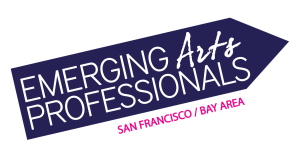Remove assumptions
Increase diversity of experience
Re-center marginalized experience and voices (race, ability, gender, sexuality, class, age, health status)
Create models for systemic power shift
-
Emerging Arts Professionals, Bay Area embodies a Cultural Equity Framework. Our framework incorporates the varied communities of the bay area.
- We require representation of those communities, and will actively seek out communities and experiences that are not currently represented and work to bring those outside in.
- Our creative community is inclusive and holds space for people regardless of race, age, physical ability, health status, incarceration history, gender, or sexuality.
- We seek to remove assumptions based on external markers, holding that each person at the table is whole and has a wealth of experience and nuance to share.
- We invest time into knowing the people we interact and work with by having deep conversations and asking questions, understanding that this means every interaction takes longer.
Models for systemic power shifts:
- Implementation of an Organizational Culture Statement, highlighting EAP’s intentions and outcomes.
- Omni-directional mentorship approach – everyone has something to learn and to teach, and we are seeking knowledge-sharing at all levels.
- Leadership term limits – evolving the work and focus of our organization; acknowledging and planning for change to allow for the organization and programs to evolve with the needs of the sector.
- Developing advisory boards and fellowship cohorts that reflect the diversity of our community, casting a wide net to find a large cross-section of participants.
- Broad outreach, casting a wide net to include those who may not self-identify as arts administrators but who are doing the work: artists, laborers, cultural workers, youth workers, activists, and people interested in supporting the arts as a place for cultural expression and human values.
- Actively sharing resources and organizational experiences, when appropriate.
- Transparent and ongoing evaluation to track and highlight this work.
Cultural Protocols
Practices for Equitable, Liberatory Exchange
These practices are a reflection of our deeper and more comprehensive EAP Equity Framework and Cultural Statement. They bring into space a way of being together that can be equitable. And it requires all of us to actively practice them throughout our time together. This experience may shift the way some experience their identity, privilege, and power. It also may not. Either way, it will show you a window into something.
These practices have been developed, honed, and refined over a ten year period and reflect the insights, wisdoms, knowledges, expressions, and talents of a multitude of peoples of diverse bodies, sexualities, ethnicities, genders, abilities, histories, and countries of origin. They are a gift and respecting them means to practice them.
EAP PRACTICES
CONVENE IN CIRCLE
What does the circle symbolizes? In a circle you can view the whole. There is no hierarchy; we are all together and equal.
Colonization prioritizes straight lines, achievement, and individual acquisition; Decolonization prioritizes circles, continuous learning, and group stewardship
PRACTICE CONSENT
All parties must consent to share words, names, or details; Otherwise, only share learnings and your own experience
RESPOND, DON’T REACT
Notice reactions. Pause, and allow this pause of others. Then, respond with intention.
IMPACT / INTENT
Note that your intention is not necessarily your impact; your impact can cause unintentional harm; and you are responsible for both.
TRUST WISDOM
Trust that each person in the room is an authority on their own experience and that those experiences create unique skills and knowledge. Trust that even when experiences differ from yours, the wisdom is still true and valid.
Those who have been historically excluded, erased, and marginalized have gained the wisdom of resilience and problem-solving. They are most qualified to solve the problems that affect them.
BE SKEPTICAL OF POWER
Be skeptical of dominant narratives, systems, and power. Understand that dominant narratives have been put in place to keep specific people in power. Continue to question who has built these narratives and systems and why.
HOLD SPACE / SHARE SPACE
Be present and aware of the energy and participation in the room. Monitor your contributions and be sure to make space for others to share their contributions.
Recognizing sometimes taking up space is more important than sharing it evenly, and sometimes it’s more important to make space for others.
HONOR PLURALITY
Honor our multiplicity of knowing, expressing, exploring, and learning
Hold space for nuance, discomfort, and growth. We all experience the same moment differently, therefore we make space for multiple “truths”. There is no “normal”.
COLLECTIVE SELF CARE
Take care of yourself/body/mind while also being aware of how your care impacts this specific time and community. Understand that you have a right to pass and a right to silence. Be aware that implementing those rights has an impact on yourself and the group.
OPEN INQUIRY
Ask for clarity when needed while not expecting clarity in a manner that is clear to you. Leave time for ongoing learning and processing.
Contact us for more information about these practices, as well as talking points and examples of how these practices can be practiced in your own spaces and communities.

